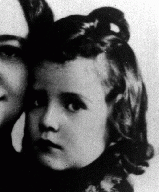
Renate Guttmann
Born: December 21, 1937
Teplice-Sanov, Czechoslovakia
Renate, her twin brother, Rene, and their German-Jewish parents lived in Prague. Shortly before the twins were born, Renate's parents had fled Dresden, Germany, to escape the Nazi government's policies against Jews. Before leaving Germany to live in Czechoslovakia, Renate's father, Herbert, worked in the import-export business. Her mother, Ita, was an accountant.
1933-39: Renate's family lived in a six-story apartment building along the #22 trolley line in Prague. A long, steep flight of stairs led up to their apartment, where Renate and her brother, Rene, shared a crib in their parents' bedroom; a terrace overlooked the yard outside. Renate and Rene wore matching outfits and were always well-dressed. Their days were often spent playing in a nearby park. In March 1939 the German army occupied Prague.
1940-45: Just before Renate turned 6, her family was sent to Auschwitz from the Theresienstadt ghetto. There, she became #70917. She was separated from her brother and mother and taken to a hospital where she was measured and X-rayed; blood was taken from her neck. Once, she was strapped to a table and cut with a knife. She got injections that made her throw up and have diarrhea. While Renate was ill in the hospital after an injection, guards came in to take the sick to be killed. The nurse caring for her hid her under her long skirt and she was quiet until the guards left.
Renate and her brother survived and were reunited in America in 1950. They learned that as one pair of the "Mengele Twins," they had been used for medical experiments.